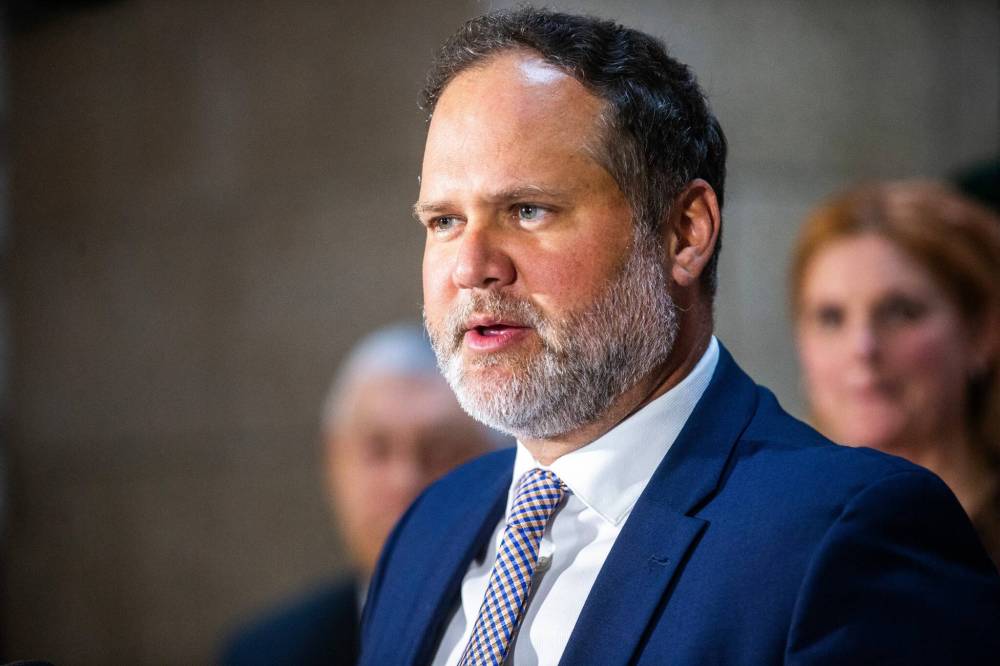Manitoba justice minister asks feds for greater civil forfeiture powers
Advertisement
Read this article for free:
or
Already have an account? Log in here »
To continue reading, please subscribe:
Monthly Digital Subscription
$0 for the first 4 weeks*
- Enjoy unlimited reading on winnipegfreepress.com
- Read the E-Edition, our digital replica newspaper
- Access News Break, our award-winning app
- Play interactive puzzles
*No charge for 4 weeks then price increases to the regular rate of $19.95 plus GST every four weeks. Offer available to new and qualified returning subscribers only. Cancel any time.
Monthly Digital Subscription
$4.99/week*
- Enjoy unlimited reading on winnipegfreepress.com
- Read the E-Edition, our digital replica newspaper
- Access News Break, our award-winning app
- Play interactive puzzles
*Billed as $19.95 plus GST every four weeks. Cancel any time.
To continue reading, please subscribe:
Add Free Press access to your Brandon Sun subscription for only an additional
$1 for the first 4 weeks*
*Your next subscription payment will increase by $1.00 and you will be charged $16.99 plus GST for four weeks. After four weeks, your payment will increase to $23.99 plus GST every four weeks.
Read unlimited articles for free today:
or
Already have an account? Log in here »
Hey there, time traveller!
This article was published 09/02/2025 (335 days ago), so information in it may no longer be current.
Manitoba’s justice minister is asking the federal finance and public safety ministers to better combat money laundering by beefing up the civil forfeiture powers of the provinces and allowing for better co-operation across jurisdictions.
Provincial justice minister Matt Wiebe requested “further action at the federal level to help crack down on money laundering” in a letter to Public Safety Minister David McGuinty and Finance Minister Dominic LeBlanc.
Wiebe asserted federal action would give provincial agencies “important new tools to cut off the money supply to organized crime and help us get toxic drugs like fentanyl off our streets,” in a letter sent Friday afternoon and provided to the Free Press.

Justice Minister Matt Wiebe (Mikaela MacKenzie / Free Press files)
Civil forfeiture is a process in which governments can ask civil courts to allow them to retain property and other assets, such as cash, that are believed to be linked to crime.
Wiebe’s letter argued the federal government could take “immediate steps” to beef up civil forfeiture.
Among his requests are for the federal government to implement amendments to the Proceeds of Crime Terrorist Financing Act, passed last year, which the minister said will enable information sharing between the Financial Transactions and Reports Analysis Centre of Canada, which oversees the federal anti-money laundering regime, and civil forfeiture authorities across Canada.
Wiebe also requested the federal government amend the Income Tax Act to allow for tax records to be disclosed to provincial civil forfeiture authorities and to amend the Bank Act to “ensure there are no gaps in forfeiture of bank accounts… in jurisdictions without civil forfeiture programs.”
The minister also requested the Canadian government work to ensure federal law enforcement agencies “recognize civil forfeiture as an important and preferable option” to establish a consistent and integrated approach to combating money laundering across Canada.
Wiebe ended the letter by saying the Manitoba government wants to work closely with its federal counterpart to “implement meaningful reforms” on the money laundering file and requesting a meeting with McGuinty and LeBlanc to discuss it.
Manitoba brought in civil forfeiture legislation in 2004 and the New Democratic government passed the Unexplained Wealth Act last year, which gives forfeiture investigators the power to force numbered corporations to disclose information about a property owner, business partners and corporate directors, Wiebe said in the letter.
Last week, the province directed Manitoba Liquor and Lotteries to disclose all suspicious transactions directly to local law enforcement, on top of reporting to federal anti-money laundering agency, the Financial Transactions and Reports Analysis Centre of Canada, Wiebe noted in the letter.
Canadian casinos are required by law to report cash transactions that exceed $10,000 — by filing separate reports for payouts and buy-ins — to FINTRAC, as well as reports for any transaction they suspect could be related to money laundering or other illegal activity.
The announcement was billed as an effort to better crack down on attempted money laundering at casinos, a cash-rich environment often targeted by criminals trying to launder money.
Civil forfeiture does not require a criminal conviction. Advocates for the process argue it’s a powerful tool to combat money laundering, though government use of the proceedings as well as unexplained wealth orders have faced criticism from civil liberties groups and academics concerned about the potential for Charter of Rights and Freedoms infringements and privacy violations.
erik.pindera@freepress.mb.ca

Erik Pindera is a reporter for the Free Press, mostly focusing on crime and justice. The born-and-bred Winnipegger attended Red River College Polytechnic, wrote for the community newspaper in Kenora, Ont. and reported on television and radio in Winnipeg before joining the Free Press in 2020. Read more about Erik.
Every piece of reporting Erik produces is reviewed by an editing team before it is posted online or published in print — part of the Free Press‘s tradition, since 1872, of producing reliable independent journalism. Read more about Free Press’s history and mandate, and learn how our newsroom operates.
Our newsroom depends on a growing audience of readers to power our journalism. If you are not a paid reader, please consider becoming a subscriber.
Our newsroom depends on its audience of readers to power our journalism. Thank you for your support.







